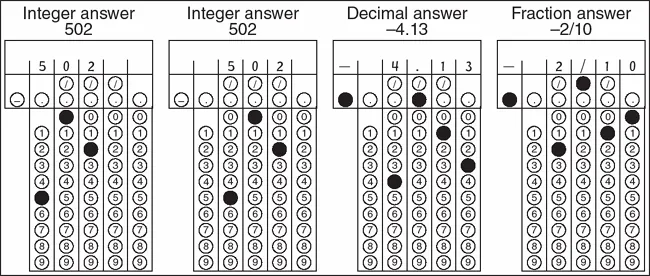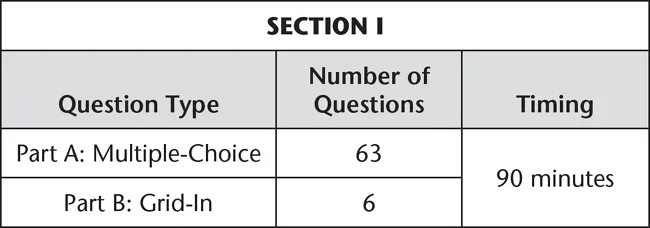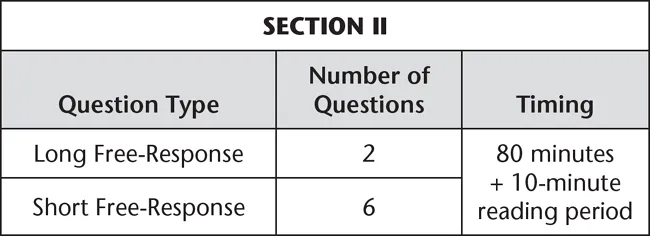![]()
PART I
INTRODUCTION
![]()
Chapter 1
Keys for Success on the AP Biology Exam
I. Using the AP Biology Crash Course to Prepare for Success
Beginning with the May 2013 test administration, the AP Biology exam is undergoing a radical change. Instead of focusing on broad topics (cells, evolution, etc.), the revised AP Biology exam tests students on their critical-thinking abilities and performance in inquiry-based labs. Don’t worry—these changes are covered in this book.
This Crash Course is based on a careful analysis of the revised AP Biology course curriculum and exam format. Parts 2–5 provide you with a detailed review of each of the topics from the AP Biology syllabus, in the same order as the syllabus itself. Part 6 covers everything you need to know about the AP Biology labs, science practices, and writing an essay.
This Crash Course contains all the information you need to know to earn a score of 4 or 5. Use it as a supplement to your coursework and as a final review in the last few weeks before the exam.
1. The Content of the Advanced Placement Biology Examination
The revised Advanced Placement Biology course is focused on building students’ understanding of biological concepts and developing their reasoning skills in a scientific laboratory setting. The AP Biology curriculum is based on 4 Big Ideas that are designed to help students understand core scientific principles and other biological concepts. The course also includes 13 inquiry-based laboratories. The labs test AP students’ inquiry skills and encourage them to think like scientists.
The AP Biology course is the equivalent to a two-semester college-level introductory biology course. In order to succeed on the exam, students need to master the key concepts that make up the 4 Big Ideas and apply these concepts to various situations in a traditional test format. The 4 Big Ideas are:
Big Idea 1: Evolution— The evolutionary process is responsible for the diversity of life.
Big Idea 2: Cellular processes: energy and communication—Biological systems use molecular building blocks and energy to maintain homeostasis, reproduce, and grow.
Big Idea 3: Genetics and information transfer—Living systems retrieve, transmit, store, and respond to information essential to life processes.
Big Idea 4: Interactions— Biological systems interact and possess complex properties.
2. The Structure of the Exam
The AP Biology exam is made up of two sections: multiple-choice and free-response. Each section includes questions that test students’ understanding of the 4 Big Ideas.
The exam is 3 hours in length. It is comprised of 63 multiple-choice questions, 6 grid-in questions, 6 short free-response questions, and 2 long free-response questions. The grid-in questions require that you perform calculations with a calculator (graphing calculators are not allowed) and fill-in the bubble with the value. You will not be given any answer selections for the grid-in questions.
Section I: Multiple-choice = 50% of the exam grade
Parts A and B: 90 minutes, 63 multiple-choice questions; 6 grid-in questions
Students should note that beginning with the May 2013 exam, the multiple-choice questions will consist of four answer options (A through D) instead of the five answer choices that have historically characterized the exam. As on previous AP Biology exams, your score will be based upon the number of correct responses you give. No scoring penalties are imposed for incorrect or unanswered questions.
The 6 grid-in questions will test the students’ science and mathematical skills. Students will be required to calculate the correct answer for each question and fill it in on a grid on the answer sheet.
A sample appears below:
Section II: Free-Response Section = 50% of the exam grade
Students will have 80 minutes to answer 6 short-response questions and 2 long-response questions. The free-response section begins with a 10-minute mandatory reading period in which students can read the questions and plan their responses.
To achieve a high score on the free-response questions, students must provide ample scientific reasoning, relevant examples, and other appropriate evidence to support their answers.
AP Biology Exam Format at-a-Glance
Beginning with the May 2013 exam, students will be permitted to use a four-function calculator (with square root) to answer questions on both sections of the exam since both sections contain questions requiring data manipulation. To see which types of calculators are approved for the AP Biology exam, visit http://www.collegeboard.org.
As part of their testing packet, students will be given a list of formulas needed to answer quantitative questions that involve mathematical reasoning.
3. Scoring the AP Biology Exam
Total scores on the multiple-choice section of the exam are based on the number of questions answered correctly. Points are not deducted for incorrect answers or unanswered questions. The multiple-choice questions are scored by machine, and the free-response questions are scored by AP Exam Readers.
Free-response question scores are weighted and combined with the results of the computer-scored multiple-choice questions to obtain a raw score. This raw score is then converted into a composite AP score of 5, 4, 3, 2, or 1. These AP scores rate how qualified students are to receive college credit or placement:
AP Score Qualification
5: Extremely well qualified
4: Well qualified
3: Qualified
2: Possibly qualified
1: No recommendation
4 . Using Materials to Supplement Your Crash Course
The AP Biology Topic Outline is published by the College Board as a guide for teachers to use in designing their AP Biology course. Every question on the AP exam can be directly tied back to one of the topics on the course outline. Sample multiple-choice and free-response questions can be found in the revised AP Biology Course Description. We strongly recommend that you use all of these materials to prepare for the new AP Biology exam. While released AP Biology exams would be good for reviewing your content knowledge of Biology, pre-2013 exams will not help you practice the critical-thinking skills needed for the revised AP Biology exam.
5. Some Basic Test-Taking Strategies
One of the best ways to prepare for the AP Biology exam is to take the free online practice exam available with the purchase of this book. This practice exam will help you become familiar with the format of the new test and the types of questions you will be asked. The Detailed Explanations of Answers section will provide feedback that will help you to understand which questions give you the most difficulty. Then you can go back to the text of this book, reread the appropriate sections of your textbook, or ask your teacher for help on topics that still give you trouble. The more questions you answer in preparation for this test, the better you will do on the actual exam.
When you are studying for the AP Biology exam you do not need to study separately for the two sections of the test. As you prepare for the multiple-choice questions, you are also preparing for t...



